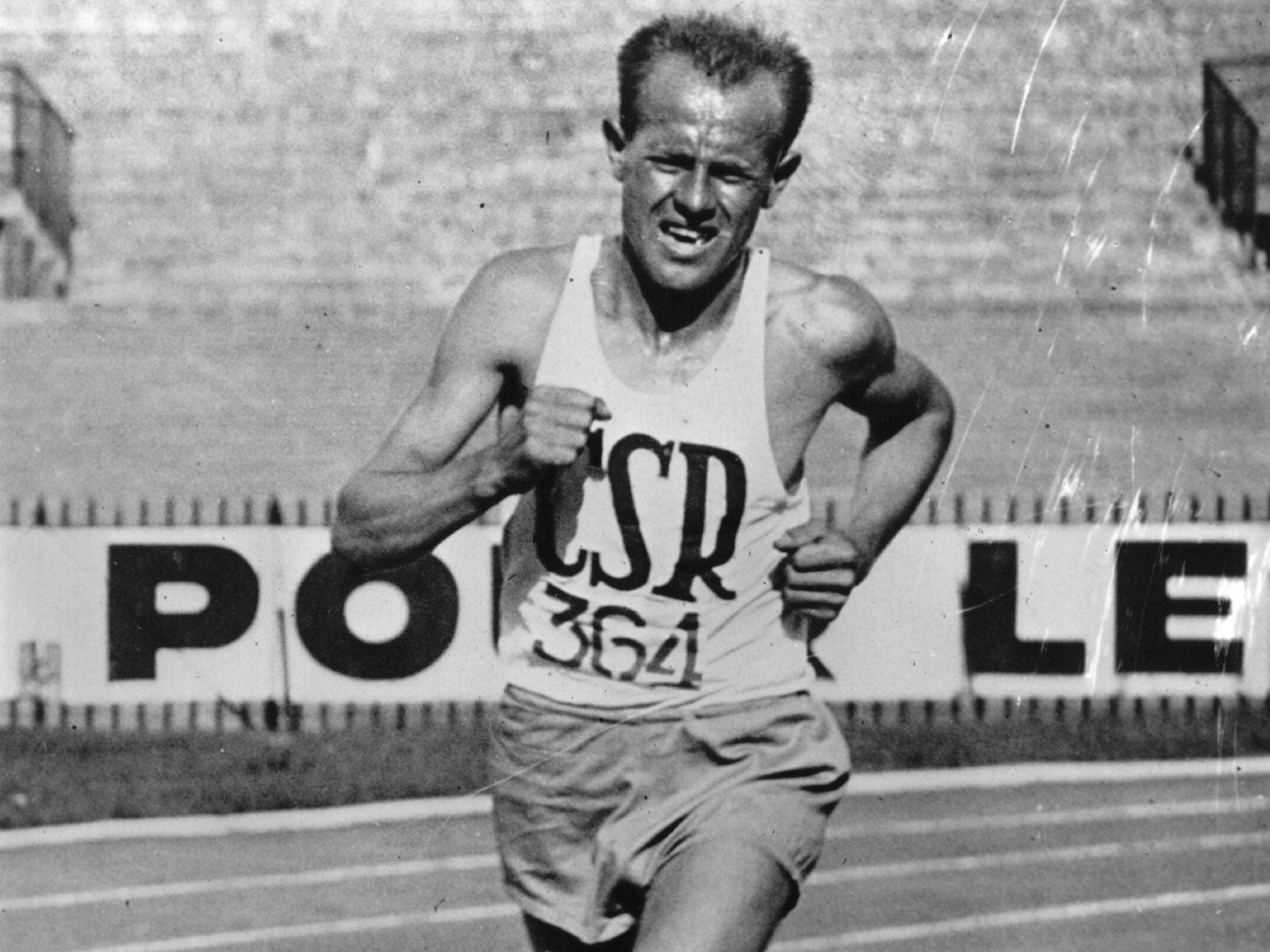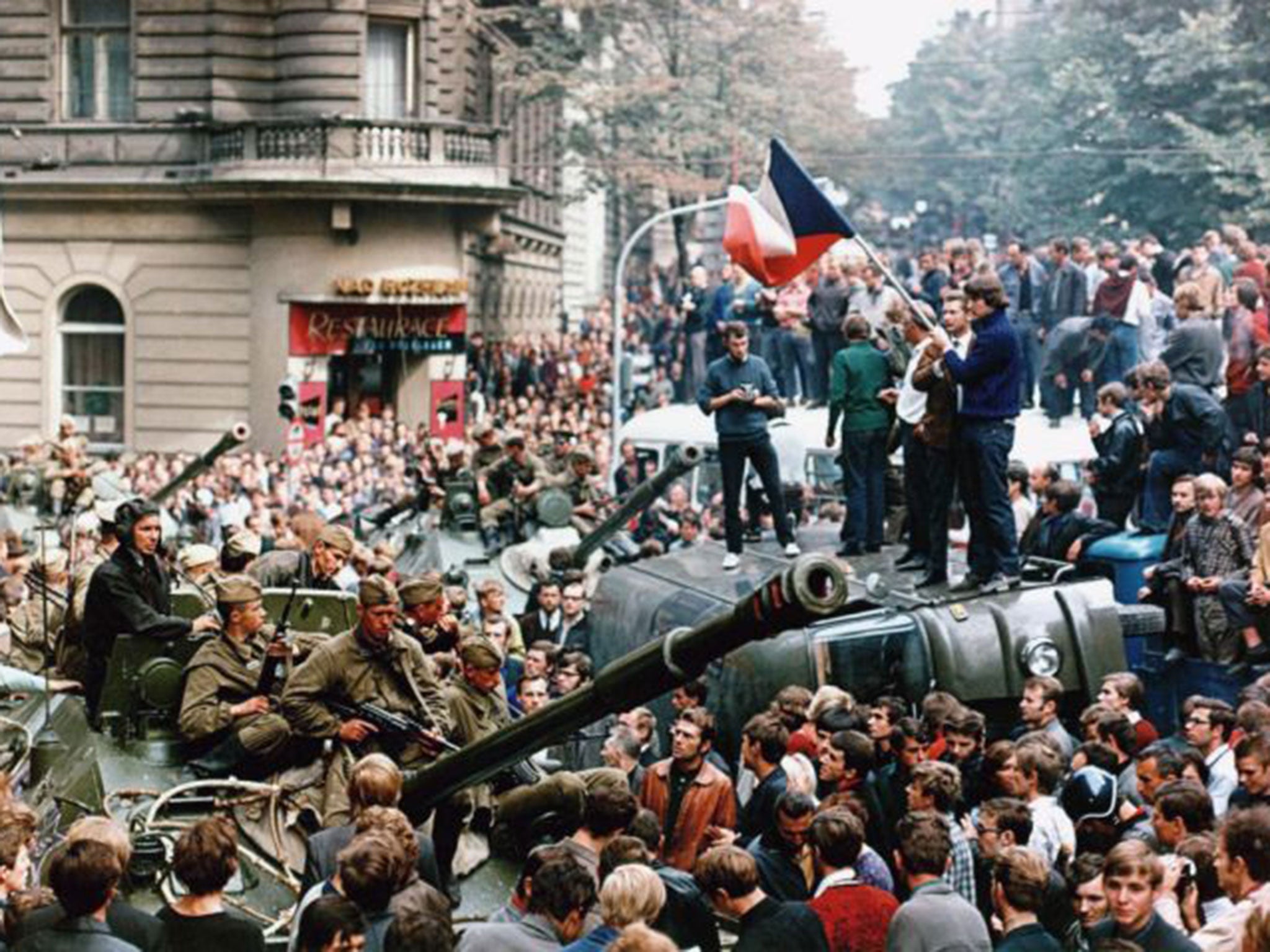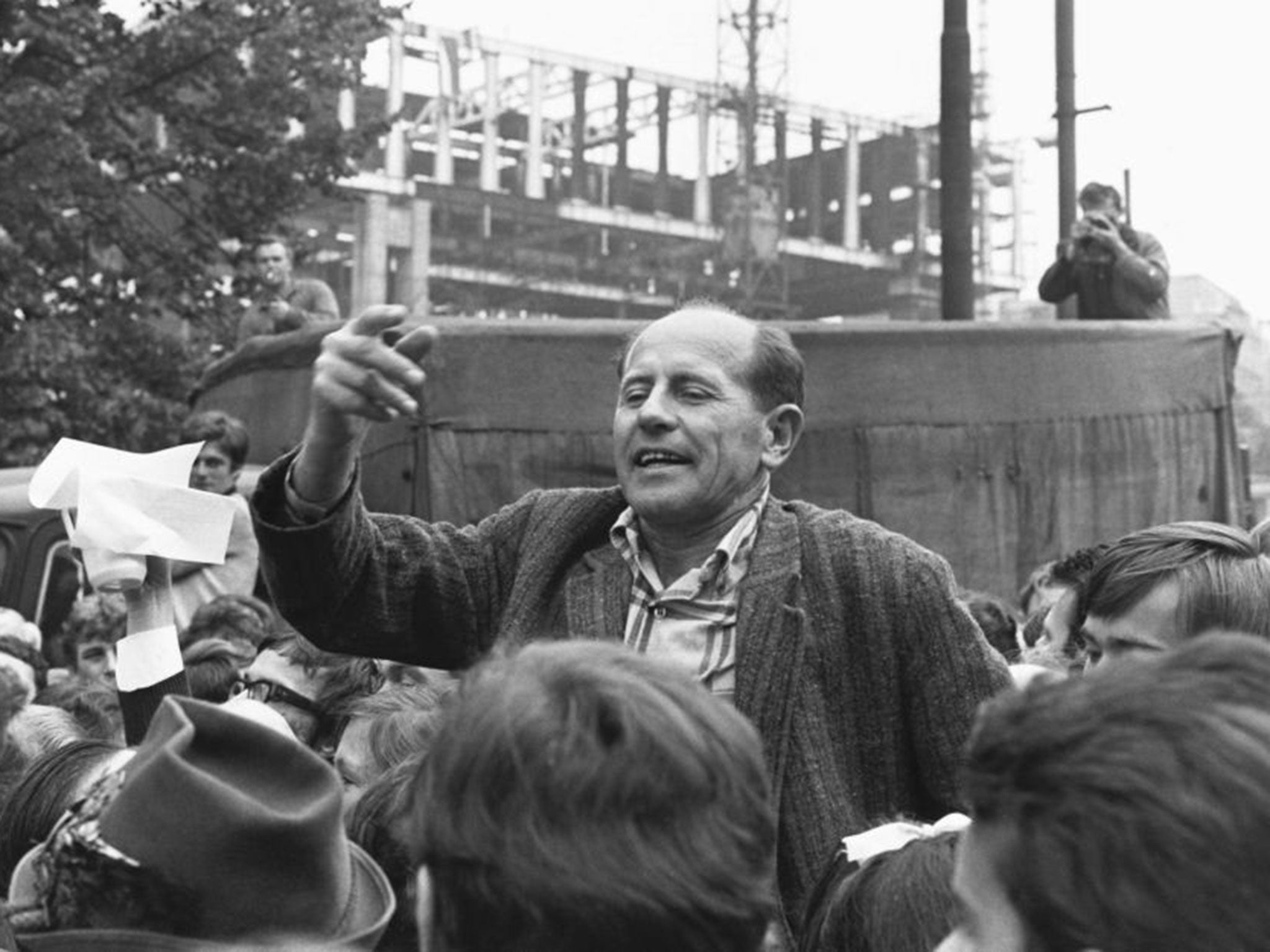Emil Zátopek: The greatest Olympian vanished from public life after he defied Russian tanks in 1968
Emil Zátopek was once the world's best loved athlete – many runners still consider him the greatest Olympic champion of all. But in 1968 his life took a turn for the worse. His brave stand against the Soviet tanks that invaded his native Czechoslovakia saw him fall foul of the Communist authorities – and vanish from public life. Today, he is all but forgotten. And yet, argues Richard Askwith, his story is as relevant today as it has ever been

Twenty minutes before midnight on 20 August 1968, a huge Soviet-led army of Warsaw Pact forces invaded Czechoslovakia. By the time most people realised what was happening, their nation had been overrun by 12 tank divisions, 12 motorised rifle divisions and two parachute divisions. The Czechoslovak army was confined to barracks.
By the end of 21 August, 19 civilians had been killed in Prague alone; by the end of the year, that death toll would be more than 100. The Prague Spring – a seven-month political thaw that had seen a 20-year-old Stalinist tyranny converted into what Alexander Dubcek, the new First Secretary of the Communist Party, called "socialism with a human face" – was coming to a brutal end.
The invaders moved ruthlessly to assert themselves, seizing Dubcek and key supporters from party headquarters and attempting to take control of the media. The staff at Radio Prague were driven out at gunpoint. But the Czechoslovak population refused to be intimidated. Radio broadcasts were made from clandestine locations; road signs were vandalised to make it harder for the invaders to find their way around. As one Western news report put it: "No sooner had the great mailed fist clanged down on the land than the Czechs everywhere were scrambling out from underneath it, standing on top of it in voluble and hostile crowds."
The most voluble were in Wenceslas Square, every inch of which was taken up either by tanks or by angry, chanting Prague-dwellers. It was a remarkable display of patriotic unity and defiance. And the handful of Western journalists who were on the scene soon realised that the most visible symbol of that defiance was a balding man in a rumpled jacket, standing on a pedestal by the statue of Saint Wenceslas, furiously denouncing the invasion. It was Emil Zátopek, the nation's most famous athlete.
In fact, he was an ex-athlete. He had won his last race a decade earlier. But he remained an icon of barely describable glamour. His face was familiar from countless propaganda posters and newsreels: every Czechoslovak schoolchild knew about his triumphs. Nor was it just his compatriots who idolised him: for most of the 1950s, he had been the most famous sportsman on the planet. The impact of his protests now was electrifying.
Emil was a legend. In his prime, in the early 1950s, there were few better-known people on the planet. His achievements at the Helsinki Olympics in 1952 were unprecedented (and remain unequalled): all three distance-running golds – 5,000m, 10,000m and marathon – in the space of eight days. The marathon was assumed to have been an afterthought. He claimed it was provoked by his wife, Dana, winning gold in the javelin on the same day as his 5,000m triumph: "I decided that the ratio of medals in the Zátopek household was insufficiently weighted in my favour." It was his first attempt at the distance.
But his sporting achievements were just part of the story. It was his charm that captivated people: joyous, eccentric, life-affirming. The seventh child of a Moravian carpenter, he had spent his youth – and the Second World War – at the disciplinarian sweatshop-cum-industrial-school of the Bat'a shoe factory in Zlín. Forced to take up running against his will, he found, at 18, that he had a gift. He found, too, that regular training offered a form of escape from the oppression of Nazi occupation – and began to train with levels of obsession and invention that no one had contemplated before.
By the time of the liberation, he was the best runner in the country. He joined the newly reconstituted Czechoslovakian army and quickly became one of the first of a new breed of working-class, Communist-friendly officers. He had grown up in great poverty, and was a firm believer in the basic ideals of socialism.
In 1948, he went to his first Olympics, in London. He took a guitar to help him woo his team-mate Dana – then Dana Ingrová – with folk songs. They had been born on the same day: 19 September 1922. "We could get married on the same day too," suggested Emil, when they found out. Eventually, they did.
He was famous by then. In London, he won gold at 10,000m and silver at 5,000m. In the former, he lapped so many people that the timekeepers became hopelessly confused, recording official results for only the first 11 finishers; in the latter, he made an unforgettable impression with a heroic last-lap sprint – the drama of which was enhanced by his comically ungainly style. Sportswriters had been mocking him for this for years – for his grimaces, his clawing arms, his twisting torso: "He runs like a man who has just been stabbed in the heart"; "...as if there was a scorpion in each shoe"; "...as if he might be having a fit"; "...like a man wrestling with an octopus on a conveyor belt". He laughed it off gracefully: "I am not talented enough to run and smile at the same time." Yet in the heat of competition, it made him thrilling to watch: you could see, even feel, the effort that each stride cost him.
He missed his second gold by half a stride, and was mortified by the failure. Early next morning, he slipped away from the Communist "sharp eyes" who guarded the Czechoslovak athletes and talked his way across London, from the men's quarters in Uxbridge to the girls' boarding-school in Northwood where the Czechoslovak women were staying. He lured Dana from the dormitory by whistling their favourite song; then, sitting by the swimming-pool, tried to show her his latest medal. It fell in the pool as he was handing it to her. He dived in to fetch it, and was still getting dressed when the school headmistress emerged – to see a naked Czechoslovak fumbling with his clothes while his girlfriend looked embarrassed nearby. He was soon out on the street, still fumbling, with the headmistress's scandalised scolding echoing through the grounds. "We felt so guilty," says Dana, giggling like a teenager as she describes the moment half a lifetime later. "But we hadn't done anything."

The story became widely known. Stories about Emil often did. He loved to tell them, to share his sense of delight in the adventure of life. He had a way with words, too. When the Czechoslovak management tried to bar him from the London opening ceremony – fearing he would get heat-stroke on a scorchingly hot day – he protested with memorable eloquence: "People at home will ask me what the Olympics were like, and I will have to tell them that I don't know, because I was sitting in the shade." When that didn't work, he temporarily talked his way into the Danish team in order to join in the parade.
Much later, he evoked the atmosphere of those games with these much-quoted words: "It was a liberation of spirit to be there... After those dark days of the war, it was as if the sun had come out. Suddenly, there were no frontiers, no more barriers, just people meeting together."
Meeting people was what he loved to do. He would chat away to his fellow athletes before, after and even during races; if he didn't speak their language, he would learn it, memorising a dictionary page by page. ("Learn enough words," he said, "and the grammar looks after itself.") He became fluent in eight languages and dabbled in more.
His fellow Olympians worshipped him. The Englishman Gordon Pirie praised his "magnificent character"; the Frenchman Alain Mimoun called him "a saint"; Ron Clarke, the Australian, said: "There is not, and never was, a greater man than Emil Zátopek."
Ordinary athletics fans were scarcely less enthusiastic. The Helsinki Olympics were supposed to be the games of the Cold War, with two separate athletes' villages embodying humanity's bitter and terrifying ideological division. Zátopek did more than anyone to turn them, by sheer force of personality, into the games of reconciliation, where athletes and spectators of all nations came together and celebrated their common humanity. They did so largely through celebrating him: his genius, his tenacity, his life-affirming exuberance.
His eccentricities were the talking-point of the games. Spectators and athletes from every nation exchanged rumours about his peculiar training routines – his habit of training in army boots, so that races in mere shoes felt easy; or jogging on the spot for hours while on sentry duty; or holding his breath until he passed out; or wearing three tracksuits at once while bounding through deep snow. (His alleged habit of running with Dana on his back came later.) Runners and their coaches were especially interested in the system of high-volume interval training he had developed: scores of flat-out 400m laps, with just a short recovery jog after each one. Experts had derided him at first. Within a few years, most of the world's top distance runners were using versions of the Zátopek method.
But the thing that excited people most about Zátopek was his humanity. They talked about his warmth, his sportsmanship, his spontaneous generosity. He gave tips and hospitality to star-struck young Western athletes who came to see him. He gave up his bed in the Olympic village (the Communist one) to a visiting Australian with nowhere to sleep. He invited another unauthorised visitor to train and dine with him. He gave his socks to his English rival, Pirie. He shared his training secrets with anyone who asked – and in mid-race would offer words of encouragement to rivals, or take the lead when it was not in his interests to do so, out of sportsmanship.
What they didn't know, back then, was of the extraordinary stand he had taken immediately before the games, refusing to board the plane to Helsinki – and actually letting it take off without him – until his friend Stanislav Jungwirth, excluded from the Czechoslovak team for political reasons, was reinstated. Nor could they have imagined what would ultimately become his most famous act of generosity, in 1966, when he gave one of his gold medals to Ron Clarke – the greatest distance runner never to win a gold of his own. Even without such knowledge, however, there could be no doubt about the sporting values that Zátopek stood for. Fred Wilt, his American rival at 10,000m, called him "perhaps the most humble, friendly and popular athlete in modern times"; and when Emil entered the stadium at the end of the marathon in 1952, 70,000 people chanted his name with such spine-tingling unanimity that one British journalist described it as "the greatest happening in athletics history". "At that moment," recalled Juan Antonio Samaranch, a future president of the International Olympic Committee, "I understood what the Olympic Spirit means."
Zátopek's actions in 1968 were typical of his bold, impulsive spirit. He was an enthusiastic supporter of Dubcek's liberalisation; eight weeks before the invasion, he and Dana had been prominent signatories of the liberals' manifesto, The Two Thousand Words. That alone would have marked him out for retribution, once the Communist old guard had been forcibly restored to power. Instead of keeping their heads down, however, Emil and Dana, who lived in central Prague, went out to see what was happening.
There were tanks and people everywhere. A low growling sound, mechanical and human, filled the air. The couple made their way, slowly, to Wenceslas Square, where the crowds were thickest. Some people were shouting, some hitting the tanks with their fists.
"Then people started to notice Emil," says Dana. "They asked him what he thought. He was quite mad. He said the Russians should not be allowed to go to the Olympics" – which were due to begin in Mexico City six weeks later.

Some people were speaking directly to the soldiers, asking them in Russian what they were doing; Emil joined in. A few soldiers replied to the effect that they had come to help the Czechoslovaks to deal with the counter-revolution that was threatening them; others said they didn't know. "Some of them didn't even know what country they were in," says Dana.
According to his fellow reformer Ludek Pachman, the chess grandmaster, on that first evening, "Emil was clearly the dominant figure". With his champion's instinct for recognising the moment that really mattered and seizing it, he was throwing every ounce of his energy into the battle. At one point, according to Pachman, Emil "rushed towards a group of Soviet soldiers, announced his name and sporting titles, and then straight away said (in Russian), 'Come on, let's talk'". Other accounts spoke of Emil moving from tank to tank, talking to individual soldiers in turn.
"They didn't want to listen," Emil later explained, "but the people kept saying, 'Hear him out. He is our Olympic champion'." Eventually an officer came over. Emil told him how upset everyone was by the invasion, and how harmful it was to the Communist movement. He also invoked the idea of the Olympic truce: the ancient tradition that nations wishing to participate in the Games had to abstain from warfare. "He said nothing," according to Emil, "but at the end, he shook my hand. That told me that maybe he felt not right about what he was doing."
Emil continued to protest, visibly and volubly, for weeks – even after Dubcek succumbed to overwhelming Soviet pressure and signed the Moscow Protocol, agreeing to reverse some of his most important reforms. Emil's denunciations of the Soviets – "the gangsters of the world", he called them – echoed far beyond the Iron Curtain. But it was always going to end badly. By 1969, the Communist old guard was firmly back in control. Those who had supported liberalism and condemned the invasion paid a heavy price. Some were imprisoned; a few ended up in suspiciously early graves; most were just frozen out from employment, from public life and from the society of anyone who knew what was good for them. The fact that Emil ended up in the third category must have owed something to the Western athletes and friends who staged "Zátopek in danger" demonstrations and wrote letters to the Czechoslovak government demanding assurances that he would not be harmed.
His fate was still unpleasant. He was expelled from the army and the Communist Party, and his new pariah status made it almost impossible for him to find work. Eventually he was allowed to become an employee of a drilling company that prospected for water and minerals in remote parts of rural Czechoslovakia. He was part of a small, itinerant team, one of whom was usually a secret service informer. They not only worked together but lived together, sleeping in a shared maringotka or caravan. Every two or three weeks they were allowed home for a day or two.
The exile lasted for four-and-a-half years. Zátopek's name was erased from textbooks: his use as a propaganda icon ceased abruptly. He could cope with the physical hardship, but the exile and disgrace hurt him deeply. His marriage suffered; he drank heavily. Once, near the village of Lytomysl, a local woman sent her son to present him with a small gift, a piece of smoked meat. The boy was shocked by the dishevelled figure who opened the maringotka door. "I am not the Zátopek you used to know," confessed Emil, bottle in hand. Another time, Dana drove an old friend, the Spanish sports official Patxi Alcorta, to visit Emil at a remote site near Jihlava. The two men embraced – Emil still in the overalls in which he often slept as well as worked. On the journey back, Alcorta wept: "Is this how they treat their hero?"
Eventually, after a series of public capitulations to the regime for which the dissident movement never forgave him, Emil was allowed to return to Prague. But the Communists never forgave him either – he was still a traitor to the Soviet cause. His memory languished, even when he was officially rehabilitated after the Velvet Revolution of 1989. Among a hard core of runners around the world, he has remained a kind of patron saint of their sport; but the Czechs and Slovaks had largely lost their enthusiasm for him.
There was a flurry of attention on his death, in November 2000; since then, his fame has continued to fade. Yet now, belatedly, the Czech sporting establishment is embracing its national hero. Every Czech athlete at this summer's Olympics in Rio will have a Zátopek symbol on their vest. It is an overdue gesture to an athlete who not only made his country famous but did so with a friendliness that, in the words of the Australian coach Percy Cerutty, made it "seem preposterous that we should ever be required to hate each other".
"A runner must run with dreams in his heart, not money in his pocket," Zátopek is supposed to have said. We could do with a few more athletes like him today.
Adapted from 'Today We Die A Little: The Rise and Fall of Emil Zátopek, Olympic Legend', by Richard Askwith (Yellow Jersey, £16.99). Published on 21 April, this title will then be available for a special price from the Independent Bookshop, call 01326 569444
Join our commenting forum
Join thought-provoking conversations, follow other Independent readers and see their replies
Comments
Bookmark popover
Removed from bookmarks